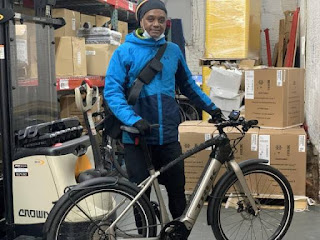That was a strange time in my life. I had a college degree. I'd lived and worked in Paris. But I had absolutely no idea of what I wanted to do next. Actually, I didn't want to know: I knew that I could be turned into a writer and/or an educator, in some fashion or another, but I was too angry to want those things, or much of anything else. And I was stupid enough to think that sort of anger made me superior to-- or, at least, more sensitive or wounded than-- other people.
I told family members and my few friends (actually, by that time, one friend) that I wasn't ready to commit to a profession, or to even work in an office. The truth was that I couldn't have done those things, to please them or anyone else. And there simply wasn't anything else motivating me to do those things--or much of anything else, quite frankly.
A grandmother and an uncle who were very close to me had recently died. And a friend had committed suicide. Of course, I had other demons and ghosts as well. I didn't think anyone else could understand them; in truth, they didn't even make sense to me. So, I didn't want to talk, much less answer, to anyone unless I absolutely had to.
So what else could I have been, at that time in my life, but a messenger?
Remember that in those days--circa 1983--there was absolutely no status in being a messenger. It wasn't a job that hipsters (or their equivalents in those days) did. And only the really hard-core cyclists rode fixed-gear bikes; they weren't the status symbols of those who were trying to show, or make themselves or their friends believe, they weren't bourgeois.
At that time, messenger bags weren't fashionable accessories.
So, when I stopped messengering (Surely some English teacher told you "Gerunding nouns is wrong." I didn't listen. It just figures that I teach English now.), I sold my bag without thinking about it. I'd just begun to work for American Youth Hostels, when it was located on Spring Street and the neighborhood still had some halfway interesting art and sandwich shops with names like "Rocco and His Brothers." One guy, named Judah, used to hang out there when he wasn't making his rounds on his old Peugeot. He had been a messenger, it seemed, since before the rest of us were born. I used to see him on the streets when I was dodging cabs and pedestrians for my commissions. So, at one time or another, did every other messenger in Manhattan.
He told me that a friend of his was going follow him into the business I'd just left and therefore needed a messenger bag. I'd used mine for about a year. Smog, slush, rain, pizza drippings, spilled drinks-- and a couple of burns from cigarettes that weren't made by companies that contributed to the campaigns of Southern politicians-- left their almost-still-viscous mosaic on the once-bright green canvas. Still, the bag was as strong as it was the day I bought it. So, Judah's courier- novitiate friend paid me not much less than I paid for the bag.
When I bought it new, it was just like the bag in this photo--except, of course, that mine was green:
It was made--to my order--by a small company called Globe Canvas, which was located in the basement of some building in Chinatown, if I remember correctly. The guy who, it seemed, was Globe Canvas asked which messenger service I was working for. From my answer, he knew which size and color bag to make. He was an older Italian gentleman and seemed like one of those forces of nature that always did, and always would be doing, whatever you saw him doing. I hear that he died a couple of years ago. I'm not surprised, as he was far from being a young man even then.
Anyway, these days, it seems that every other company that makes a messenger bag--or, more precisely, a bag that reflects the self-conscious aspirations to hipness of its owner as much as the style of the bag I carried for a year--says that theirs is the "original."
I say that if any bag was the original, nobody would--or could--buy it. Only the down-and-out, reject-of-society messenger of yore could ever have had such a thing. And he wouldn't be bragging about it.
It was a great bag, though. Almost nothing you can buy today is as well-made. I'd love to have it now, even if I haven't used a messenger bag since the day I made my last delivery.



















